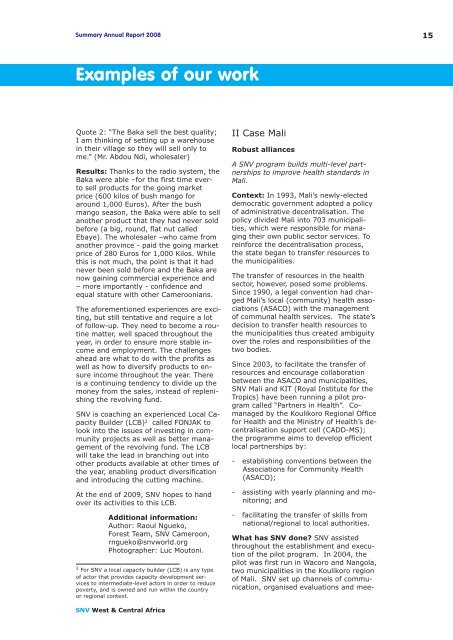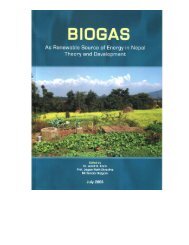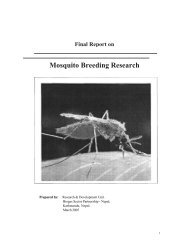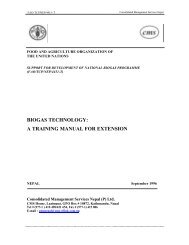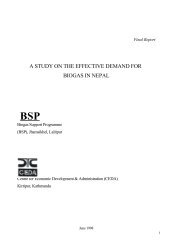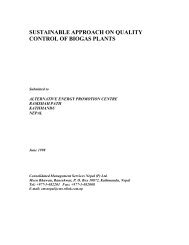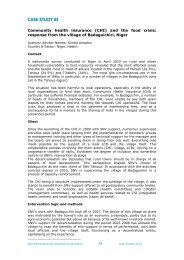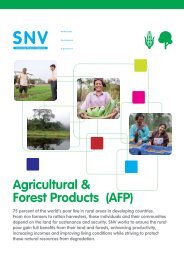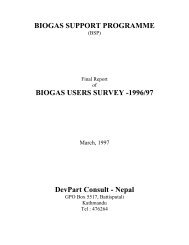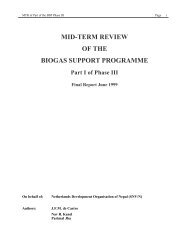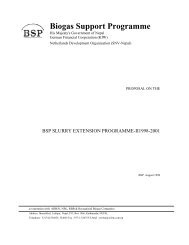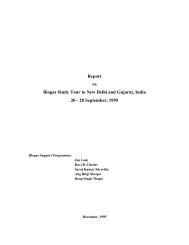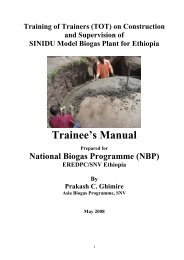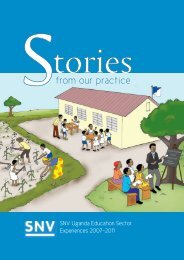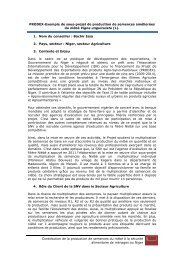download (pdf, 3MB) - SNV
download (pdf, 3MB) - SNV
download (pdf, 3MB) - SNV
You also want an ePaper? Increase the reach of your titles
YUMPU automatically turns print PDFs into web optimized ePapers that Google loves.
Summary Annual Report 2008 15<br />
Examples of our work<br />
Quote 2: “The Baka sell the best quality;<br />
I am thinking of setting up a warehouse<br />
in their village so they will sell only to<br />
me.” (Mr. Abdou Ndi, wholesaler)<br />
Results: Thanks to the radio system, the<br />
Baka were able –for the first time everto<br />
sell products for the going market<br />
price (600 kilos of bush mango for<br />
around 1,000 Euros). After the bush<br />
mango season, the Baka were able to sell<br />
another product that they had never sold<br />
before (a big, round, flat nut called<br />
Ebaye). The wholesaler –who came from<br />
another province - paid the going market<br />
price of 280 Euros for 1,000 Kilos. While<br />
this is not much, the point is that it had<br />
never been sold before and the Baka are<br />
now gaining commercial experience and<br />
– more importantly - confidence and<br />
equal stature with other Cameroonians.<br />
The aforementioned experiences are exciting,<br />
but still tentative and require a lot<br />
of follow-up. They need to become a routine<br />
matter, well spaced throughout the<br />
year, in order to ensure more stable income<br />
and employment. The challenges<br />
ahead are what to do with the profits as<br />
well as how to diversify products to ensure<br />
income throughout the year. There<br />
is a continuing tendency to divide up the<br />
money from the sales, instead of replenishing<br />
the revolving fund.<br />
<strong>SNV</strong> is coaching an experienced Local Capacity<br />
Builder (LCB) 2 called FONJAK to<br />
look into the issues of investing in community<br />
projects as well as better management<br />
of the revolving fund. The LCB<br />
will take the lead in branching out into<br />
other products available at other times of<br />
the year, enabling product diversification<br />
and introducing the cutting machine.<br />
At the end of 2009, <strong>SNV</strong> hopes to hand<br />
over its activities to this LCB.<br />
Additional information:<br />
Author: Raoul Ngueko,<br />
Forest Team, <strong>SNV</strong> Cameroon,<br />
rngueko@snvworld.org<br />
Photographer: Luc Moutoni.<br />
2 For <strong>SNV</strong> a local capacity builder (LCB) is any type<br />
of actor that provides capacity development services<br />
to intermediate-level actors in order to reduce<br />
poverty, and is owned and run within the country<br />
or regional context.<br />
II Case Mali<br />
Robust alliances<br />
A <strong>SNV</strong> program builds multi-level partnerships<br />
to improve health standards in<br />
Mali.<br />
Context: In 1993, Mali’s newly-elected<br />
democratic government adopted a policy<br />
of administrative decentralisation. The<br />
policy divided Mali into 703 municipalities,<br />
which were responsible for managing<br />
their own public sector services. To<br />
reinforce the decentralisation process,<br />
the state began to transfer resources to<br />
the municipalities.<br />
The transfer of resources in the health<br />
sector, however, posed some problems.<br />
Since 1990, a legal convention had charged<br />
Mali’s local (community) health associations<br />
(ASACO) with the management<br />
of communal health services. The state’s<br />
decision to transfer health resources to<br />
the municipalities thus created ambiguity<br />
over the roles and responsibilities of the<br />
two bodies.<br />
Since 2003, to facilitate the transfer of<br />
resources and encourage collaboration<br />
between the ASACO and municipalities,<br />
<strong>SNV</strong> Mali and KIT (Royal Institute for the<br />
Tropics) have been running a pilot program<br />
called “Partners in Health”. Comanaged<br />
by the Koulikoro Regional Office<br />
for Health and the Ministry of Health’s decentralisation<br />
support cell (CADD-MS);<br />
the programme aims to develop efficient<br />
local partnerships by:<br />
- establishing conventions between the<br />
Associations for Community Health<br />
(ASACO);<br />
- assisting with yearly planning and monitoring;<br />
and<br />
- facilitating the transfer of skills from<br />
national/regional to local authorities.<br />
What has <strong>SNV</strong> done? <strong>SNV</strong> assisted<br />
throughout the establishment and execution<br />
of the pilot program. In 2004, the<br />
pilot was first run in Wacoro and Nangola,<br />
two municipalities in the Koulikoro region<br />
of Mali. <strong>SNV</strong> set up channels of communication,<br />
organised evaluations and mee-<br />
<strong>SNV</strong> West & Central Africa


